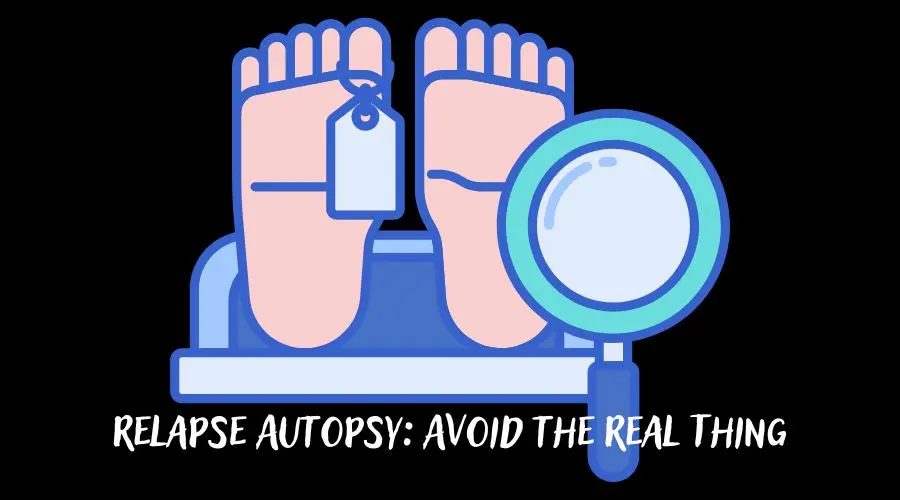What is a Relapse Autopsy in Sobriety?
Dissect the Cause of Relapse and Better Protect Your Recovery
Let’s face the hard truth right up front: relapse to alcohol or substance use is a challenging and disheartening experience for those of us in recovery. (For those not part of the sobriety community, it refers to the return to drug or alcohol use after a period of abstinence.)
But it’s crucial to keep in mind before beating yourself up too much: the path to recovery from drinking or substance abuse is not a straight path, and relapse can happen to anyone. Relapse is not a sign of failure but can rather be an opportunity for growth and learning – if put into the right perspective.
Enter the relapse autopsy, a great way of looking at what prompted a relapse, dissecting it, and being better prepared if similar circumstances arise again.
We will also touch on the general complexities and preconditions that lead to relapse, to make our latest SOBRLIFE blog more helpful to our friends in recovery, concerned loved ones, and anyone looking to avoid a relapse when they are staying clean and sober!
The Most Common Relapse Warning Signs

Relapse does not happen suddenly. Relapse autopsies are a way of looking closely at the lead-up period and seeing the ‘red flags’ that may have been ignored or brushed off. There are always warning signs and symptoms that we pass by before picking up a drink or whatever drug happens to be our particular poison.
Different people will experience different events, triggers, and behaviors that were present in the days and even weeks leading up to a relapse. By recognizing and addressing these warning signs, the potential for relapse can be lessened, and a more mindful perspective gained on our individual ‘preconditions for picking up.’
Some of the most common warning signs of relapse may include:
- Increased cravings for drugs or alcohol, to the point of obsession
- Feelings of isolation and loneliness
- Engaging in risky behaviors and addictive behavior.
- Poor self-care and declines in hygiene
- Neglecting to use healthy coping strategies
- Experiencing regular depression or anxiety
And these are not limited to those in their first 90 days or first year of recovery. Individuals in any of the stages of recovery and their loved ones need to be aware of these warning signs, even to the point of sharing a list with their loved ones and sober support network about what to look out for.
Knowing what to avoid and being more aware of our own personal versions of a slippery slope is what makes relapse autopsies such a powerful tool!
And, even though it isn’t our creation, we would like to point out that a great relapse autopsy worksheet is also available online for printing from Purpose Healing in Arizona.
Our Top 5 Relapse Prevention Strategies
Preventing relapse requires a comprehensive approach that addresses the physical, mental, and emotional aspects of recovery (and relapse for that matter).
Here are some strategies that can help, from a team with decades of experience in the behavioral health field, and more than a few years in recovery.
- Develop a solid support system: Surrounding yourself with a supportive network of friends, family, and fellow individuals in recovery can provide the necessary support and encouragement during challenging times.
- Engage in healthy coping mechanisms: Finding positive ways to manage stress and cope with difficult emotions is crucial in preventing relapse. This could include activities such as exercise, meditation, therapy, or pursuing hobbies and interests, whether new or those we can return to with renewed interest when sober.
- Identify and avoid triggers: Understanding the specific situations, people, or places that may trigger the urge to use drugs or alcohol is vital. By recognizing and avoiding these triggers, the risk of relapse can be significantly reduced.
- Practice self-care: Taking care of yourself physically, mentally, and emotionally is essential in maintaining sobriety. This includes getting enough sleep, eating nutritious meals, and practicing self-compassion through acceptance, meditation, or self-care routines.
- Seek professional help: If you are struggling with a relapse or feel that you may be at risk, it is important to reach out to a healthcare professional or addiction specialist. They can provide guidance and support tailored to your individual needs.
If you are a member of a 12-step program, it is also a solid idea to tell your sponsor about negative thoughts or those based on the disease of addiction.
Conducting Your Own Relapse Autopsy

A relapse autopsy is a process by which individuals in recovery who have used drugs or alcohol (and abused either or both, and acknowledged they were addicts or alcoholics) can determine why they chose to break their sobriety. It involves a thorough examination of the person and the factors and circumstances leading up to the relapse and identifying the causes to avoid its recurrence in the future.
The relapse autopsy considers the mental, spiritual, and social aspects of relapse that most people agree occur before someone physically picks up a drink or drugs. It is crucial to understand that relapse is not solely about the physical act of using substances but rather a complex interplay of various factors that lead up to that pivotal moment of ‘picking up’ whatever our drug of choice or favorite booze may be.
A Checklist That Can Help Form a New Relapse Prevention Plan
During a relapse autopsy, create a checklist that can help you reflect on:
- Your emotional state leading up to the relapse
- The specific triggers and situations that led to the relapse
- Any underlying unresolved issues or stressors that were on your mind
- The failings of any coping mechanisms, if they were used
- Any changes or patterns in thoughts and behaviors prior to picking up
A relapse autopsy should be approached with self-compassion and without judgment. Its purpose is not to blame oneself but rather to gain insight into the underlying causes of the relapse or behavior and develop strategies to prevent it from happening again.
Cut yourself a break in doing it, and remember that treating yourself well is an important part of turning a new page.
5 Factors That All Too Often Contribute to Relapse
Relapse is a multifaceted phenomenon influenced by various factors. While each person’s experience may differ, some common contributing factors to the relapse process may include:
- Stress and pressure mounting at the workplace or in your home life
- Unresolved trauma or emotional pain that boils over and ‘needs’ to be numbed
- Exposure to triggers and cravings and minimizing their impact
- Poor coping mechanisms – not using a relapse prevention plan or other tools.
- Overconfidence in one’s ability to resist substances
Understanding these factors can help individuals in recovery (and those they choose to share the knowledge with) develop proactive treatment strategies to minimize the risk of relapse.
More Ways of Effectively Coping with Relapse Triggers

One crucial aspect of a relapse prevention plan is learning how to cope with triggers effectively. Triggers can be people, places, or situations that evoke cravings and increase the risk of relapse.
Here are some strategies for coping with emotional relapse triggers:
- Identify and avoid triggers: Recognize the specific triggers that may lead to relapse and take steps to avoid or minimize exposure to them.
- Develop alternative coping mechanisms: Find healthy and positive ways to cope with stress and cravings. This could include engaging in physical activities, practicing mindfulness, or talking to a trusted friend or support group.
- Practice self-care: Prioritize self-care activities that promote physical, emotional, and mental well-being. This may involve getting sufficient sleep, maintaining a balanced diet, and engaging in activities that bring joy and relaxation.
- Reach out for support: Don’t hesitate to lean on your support system when you’re feeling triggered. Whether it’s a friend, family member, or support group, open up and share your struggles.
- Modify your environment: Create an environment that supports your recovery by removing any substances or reminders of substance use. Rearrange your living space, create a positive atmosphere, and surround yourself with supportive people.
By practicing these coping skills and strategies, individuals in recovery can effectively navigate through triggers and reduce the likelihood of relapse.
Relapse Autopsies Help Stay Vigilant and Protect Your Sobriety
As many of us know all too well, substance use relapse is a complex issue and often baffling even to the most seasoned of those of us living the sober life.
But by recognizing the warning signs, implementing relapse prevention strategies, conducting a relapse autopsy, understanding the factors contributing to relapse, and learning how to cope with relapse triggers, those of us in recovery can greatly enhance our chances of maintaining sobriety.
Remember, as hard as it can seem, relapse is not a sign of failure but an opportunity for growth and learning. With the right support, your own treatment plan, and strategies in place, recovery is again possible!
Wearing Your Sober Pride With SOBRLIFE Clothing

If you are interested in expressing your commitment to sobriety and supporting others in their recovery journey, we humbly suggest you consider wearing SOBRLIFE Clothing. SOBRLIFE Clothing offers sober statement apparel that serves as an external message of support for sobriety and addiction treatment.
By wearing our sober clothing, you can help break the stigma surrounding addiction and show solidarity with the recovery community, whether you are in long-term sobriety or a newcomer.
SOBRLIFE Blogs: New Resources for Your Recovery Weekly
We hope you’ve found our relapse autopsy guide useful and concise. For our next blog topics, we’d love to hear from you about what matters to you in your recovery. Send us an email or connect with us on social platforms, from Facebook to TikTok, SOBRLIFE is there…
And don’t forget to stay tuned for even more great resources from our blog each week, with the latest in recovery resources you can use every day of the year!
